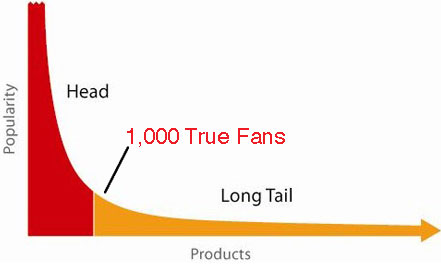Up on Boing Boing at the moment is an interesting interview with John Buckman, the founder of our favourite net-label, Magnatune. (This was the label that pioneered the idea of "pay what you like" online music distribution years before Radiohead cottoned on it.)
In 2006, Buckman set up yet another inspired online distribution scheme, Bookmooch. This time, as the name suggests, it was all about giving people an online venue to organise book swaps. In the two years since it was set up, it's acquired a membership of over 74,000 users in 90 countries and, in the process, it's actually become profitable.
And how can this be, considering that it's basically a swap-mart where no money changes hands? Well, it's because of the physics of over-stimulated demand... Because it grants access to users throughout the world, a website like Bookmooch promises unlimited book-swapping possibilities. Naturally, it can never completely fulfill this "promise" and users don't automatically expect that it will, but they do end up thinking about other books that they wish were available to swap for. In such a situation, the only option is to purchase them and Bookmooch accommodates this by providing links to Amazon, who reward Bookmooch with a percentage of resulting sales.
Buckman has called this making money "by accident" but it actually forms a solid and very non-accidental model for exploiting an online world where everything is apparently available for "free" - stimulate demand, provide partial satisfaction for free, then make money off the highly desired remainder. And if, as in the case of music, that remainder might still be freely available, make paying for it seem like an "investment" (eg listen to the MP3 for free, but pay for the FLAC so the artist can stay alive and make more of the music you love...)
None of this is new, of course, but you'll no doubt keep hearing about how "revolutionary" it is until those lumbering cultural brontosaurs like the record industry finally adopt it as part of their business plans. When that happens, hopefully John Buckman will make a packet from consultancy fees.

So far, most discussions of post-digital-download music industry business models have had a fairly top down focus. We’ve seen the cartels angst over ways to resurrect their formerly bloated bottom lines; upper echelon artists, like Radiohead and Nine Inch Nails, flirt with free downloads; and smaller switched-on labels, like Magnatune, offer more equitable distributions of download incomes to the musicians on their rosters.
What we’ve seen less of, though, are bottom-up models that help individual artists farm an income on their own terms from internet distribution of their work.
Enter the 1000 True Fan Plan… Quite simply, it’s the idea that all you need as an artist is 1000 “true fans” (ie people who will religiously purchase anything you produce.) If you can provide this fan base with a steady supply of new product that they will happily spend up to $100 a year to acquire, then you have created a revenue stream that you can comfortably live on.